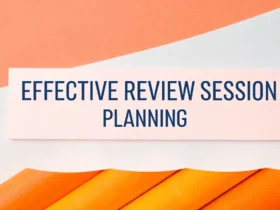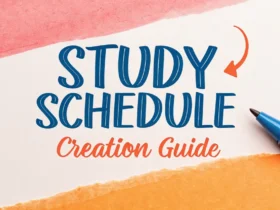Are you finding it hard to focus when you study? You are not alone. Many students struggle with concentration. It is tough to sit down and really learn when distractions pull you away. Each year, over 60% of students report struggling with focus and attention during study sessions. But it does not have to be that way.
With the right methods, you can boost your focus and get more from your study time. This guide gives you simple, proven tips to enhance your focus. You will learn how to make your study sessions more effective. With focus improvement, you can reach your academic goals with more ease and less stress.
Focus Enhancement Tips for Better Study Sessions
Studying well is not just about how long you sit with your books. It is more about how much you take in during that time. If your mind wanders, you might spend hours but learn very little. The key is to sharpen your focus. This means paying close attention and staying on task. When you are truly focused, you understand more and remember it longer.
To get the most from your study sessions, try these focus enhancement tips. They can help you stay locked in and make every minute count.
Create a Study-Friendly Space
Your study area plays a big role in how well you focus. A good space helps you settle in and keeps distractions away.
- Find a quiet spot: Look for a place where noise is low. This could be a corner in your room, a library, or a quiet café.
- Keep it tidy: A clean, orderly space helps clear your mind. Put away clutter so you have less to distract you.
- Get comfy but not too comfy: Have a good chair and desk. Make sure the lighting is right. You want to be comfortable enough to focus but not so relaxed that you get sleepy.
- Keep it consistent: Study in the same place each time. This helps your brain link that spot with study time.
- Avoid distractions: Keep your phone away. Turn off the TV. Tell others not to bother you.
Set Clear Study Goals
It helps to know what you want to get done in each study session. Clear goals keep you on track and give you something to aim for.
- Break it down: Big tasks can feel too much. Break them into smaller, more doable steps. Instead of “Read the whole chapter,” try “Read the first three sections.”
- Be specific: Say exactly what you want to achieve. “Review these ten math problems” is better than “Study math.”
- Set a time limit: Give each task a time. This pushes you to focus and stops you from spending too long on one thing.
- Write it down: Put your goals on paper. This makes them real and reminds you what to do.
- Reward yourself: When you reach a goal, take a short break or do something you like. This keeps you going.
Use the Pomodoro Technique
The Pomodoro Technique is a time method that can boost your focus. It uses short bursts of work with short breaks in between.
- Set a timer: Work for 25 minutes straight. Put all your focus on the task.
- Take a break: When the timer rings, stop and rest for 5 minutes. Get up, stretch, or look away from your screen.
- Repeat: Do four “Pomodoros” (work periods) like this.
- Long break: After four Pomodoros, take a longer break of 20-30 minutes.
- Why it works: This method stops you from getting too tired. The short breaks refresh your mind and keep your focus sharp.
Minimize Digital Distractions
In today’s world, screens can easily take your focus. Try these steps to keep digital devices from pulling you away.
- Turn off alerts: Mute notifications on your phone, tablet, and computer.
- Use apps to block sites: There are apps that block distracting websites and apps for set times.
- Put your phone away: Keep your phone out of sight. If you need it, put it in another room or in a drawer.
- Close extra tabs: Shut down any tabs on your computer that you do not need for studying.
- Tell friends you are busy: Let your friends know you are studying. Ask them not to message you unless it is urgent.
Practice Active Recall
Active recall is a study method that helps you learn better. It involves trying to remember what you have learned without looking at your notes.
- Read a section: First, read a part of your text or notes.
- Look away: Close your book or turn away from your screen.
- Try to remember: Try to recall the main points in your own words.
- Check yourself: Look back at your notes to see what you missed.
- Repeat: Do this for each section.
- Why it works: Active recall makes your brain work harder to remember. This strengthens the links in your memory.
Teach the Material to Someone Else
If you can explain a topic to someone else, you really know it. Teaching is a great way to test your knowledge and improve your focus.
- Find a listener: This could be a friend, family member, or even a pet.
- Explain it clearly: Try to explain the topic in simple terms.
- Answer questions: If your listener asks questions, answer them as best you can.
- Identify gaps: If you struggle to explain something, you know where you need to study more.
- Why it works: Teaching forces you to think deeply about the topic. It also shows you what you really understand.
Take Regular Breaks
Studying for too long can tire your mind. Regular breaks help you refresh and stay focused.
- Short breaks: Take a 5-10 minute break every hour. Get up, stretch, or walk around.
- Do something different: Do not just switch to another screen. Do something that is not like studying.
- Eat a snack: A healthy snack can give you energy. Choose fruits, nuts, or yogurt.
- Stay hydrated: Drink water to keep your brain working well.
- Why it works: Breaks stop your mind from getting too tired. They help you come back to your studies with fresh focus.
Get Enough Sleep
Sleep is key to focus and learning. If you do not get enough sleep, your brain cannot work at its best.
- Aim for 7-8 hours: Most students need at least seven hours of sleep each night.
- Keep a schedule: Go to bed and wake up at the same time each day, even on weekends.
- Make a bedtime routine: Do calm things before bed, like reading or taking a warm bath.
- Avoid screens before bed: The light from screens can keep you awake.
- Why it works: Sleep lets your brain rest and store what you have learned. It also improves your focus and mood. A recent study shows that students who get enough sleep perform better on tests by up to 15%.
Practice Mindfulness and Meditation
Mindfulness is about focusing on the present moment. Meditation is a way to train your mind to do this.
- Find a quiet place: Sit or lie down in a calm spot.
- Focus on your breath: Pay attention to the feeling of your breath coming in and out.
- Notice your thoughts: When your mind wanders, notice the thought and then bring your focus back to your breath.
- Start small: Begin with just 5-10 minutes a day.
- Why it works: Mindfulness helps you control your attention. It can lower stress and improve your focus. Research indicates that even a few minutes of daily mindfulness can greatly improve focus.
Exercise Regularly
Physical activity is good for your body and your brain. Regular exercise can improve your focus and memory.
- Aim for 30 minutes a day: Try to get at least 30 minutes of exercise most days of the week.
- Choose something you enjoy: This could be walking, running, swimming, or playing a sport.
- Break it up: If you do not have time for 30 minutes at once, break it into smaller chunks.
- Exercise before studying: A bit of exercise before you study can help sharpen your mind.
- Why it works: Exercise boosts blood flow to your brain. It also releases chemicals that improve mood and focus. A study found that regular exercise improved test scores by up to 20%.
Use Background Music or White Noise
Some people find that certain sounds help them focus. Background music or white noise can block out distractions and create a calm study space.
- Choose the right music: Look for music without words or with words you do not understand. Classical music or instrumental music often works well.
- Try white noise: White noise is a steady, even sound that can cover up other noises. You can find white noise apps or play a fan.
- Keep it quiet: The music or noise should be soft and not distracting.
- Experiment: Try different types of sounds to see what works best for you.
- Why it works: Background noise can make it easier to block out distractions. It can also create a calming effect.
Manage Stress and Anxiety
Stress and anxiety can hurt your focus. If you are worried or stressed, it is hard to concentrate.
- Identify your stressors: What things make you feel stressed or anxious?
- Make a plan: For each stressor, think of ways you can deal with it.
- Talk to someone: Talk to a friend, family member, or counselor about your worries.
- Use relaxation methods: Try deep breathing, yoga, or progressive muscle relaxation.
- Get organized: Being organized can lower stress. Make lists and keep track of your tasks.
- Why it works: Managing stress helps you clear your mind. When you are less stressed, it is easier to focus.
Eat a Healthy Diet
What you eat can affect your focus. A healthy diet gives your brain the fuel it needs to work well.
- Eat balanced meals: Include fruits, vegetables, whole grains, and lean protein in your diet.
- Avoid sugary foods: Sugary foods can give you a quick burst of energy, but then you will crash.
- Eat breakfast: Starting the day with a healthy breakfast helps improve focus.
- Stay hydrated: Drink plenty of water throughout the day.
- Limit caffeine: Too much caffeine can make you jittery and anxious.
- Why it works: A healthy diet gives your brain the nutrients it needs to focus.
Break Down Complex Tasks
Large, hard tasks can feel too much. Breaking them into smaller steps makes them easier to handle.
- Make a list: Write down all the steps you need to take to complete the task.
- Focus on one step at a time: Do not worry about the whole task. Just focus on the step you are working on now.
- Set small goals: Set goals for each step.
- Reward yourself: When you finish a step, take a break or reward yourself.
- Why it works: Breaking tasks down makes them less scary. It also helps you stay focused on each part of the task.
Review and Summarize Regularly
Taking time to review and summarize what you have learned helps you remember it better.
- Review after each section: After you read a section, take a few minutes to review the main points.
- Summarize in your own words: Write a short summary of what you learned in your own words.
- Use flashcards: Make flashcards to help you remember key facts and concepts.
- Test yourself: Use quizzes or practice tests to test your knowledge.
- Why it works: Reviewing and summarizing reinforces what you have learned. It also helps you find gaps in your knowledge.
Create a Visual Study Aid
Visual aids can help you understand and remember complex information. Use diagrams, charts, or mind maps.
- Diagrams: Draw diagrams to show how different parts of a topic fit together.
- Charts: Use charts to compare and contrast different ideas.
- Mind maps: Create mind maps to brainstorm ideas and organize your thoughts.
- Color-code your notes: Use different colors to highlight key points.
- Why it works: Visual aids make it easier to see and understand complex information. They also help you remember what you have learned.
Vary Your Study Methods
Doing the same thing over and over can get boring. Varying your study methods can keep your mind engaged.
- Read aloud: Read your notes or textbook aloud.
- Write summaries: Write summaries of what you have learned.
- Make flashcards: Use flashcards to test your knowledge.
- Teach someone else: Explain the topic to a friend or family member.
- Use online resources: Watch videos or read articles about the topic.
- Why it works: Varying your study methods keeps your mind engaged and helps you learn in different ways.
Find a Study Buddy
Studying with a friend can help you stay focused and motivated.
- Choose a good partner: Pick someone who is serious about studying.
- Set goals together: Decide what you want to achieve in each study session.
- Test each other: Ask each other questions about the material.
- Take breaks together: Take short breaks to chat or get a snack.
- Hold each other accountable: Encourage each other to stay on track.
- Why it works: Studying with a buddy provides support and motivation. It also helps you learn from each other.
Keep Practicing to Improve Your Study Sessions
Improving your focus takes time and effort. Do not get discouraged if you do not see results right away. Keep trying these tips and find what works best for you. Remember, small steps can lead to big changes. It always seems impossible until it’s done. Keep going.















Leave a Reply
View Comments